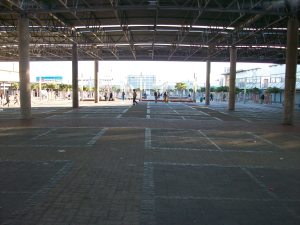Mitchell’s Plain – After participating in the Western Cape Anti-Eviction Campaign’s recent General Meeting and marching in the 24 July March against Housing Privatization, the Mitchell’s Plain Concerned Hawkers and Traders is set to join the AEC. Like the Gatesville Hawkers and the informal traders of Gugulethu, the traders of the Mitchell’s Plain Town Centre face forced removal by city officials and well-connected business people, a conflict that once again pits the nation’s first economy against the informal sector.
The struggle that gave rise to this new organization began on 13 March 2008, when SAPS and Metro Police, backed by the Army and the Dog Unit, raided this bustling town centre on the Cape Flats, cracking down, not on criminal activity, but the dozens of men and women who make their living selling everything from fruits and vegetables to cigarettes and children’s clothes. Without warning, police began breaking down hawkers’ stalls and removing goods.
“I questioned Inspector Joubert, asking him why is this thing be done,” explained Mieshka Cassiem of Lenteguer. “He said that they were ordered by their director to clean up the stands and clear them out.” It was only by resisting these evictions that the hawkers were able to prevent their relocation from the sides of the Town Centre’s busy passage ways to an isolated area on its outskirts.
It was only later, after rounds of community meetings and inquiries, that the hawkers found that their forced relocation had been requested by the United Hawkers Forum, a previously unheard of organization that has operated for fifteen years without a constitution, but yet held a seat on the Town Centre Steering Committee. The United Hawkers Forum is chaired by Mr. Kenny Brinkhuis, who Cassiem contends is a local business owner, not a trader. She also notes that when she and others tried to pass a motion of non-confidence against Mr. Brinkhuis’ committee at a community forum held on 7 May 2008, she was assaulted and thrown out of the meeting.
Further investigations revealed that the Steering Committee had secured a R304 million grant from the National Government to upgrade the Town Centre as a Targeted Improvement District. “They presented proposals as if everyone was involved in it, even though there was no participation,” said Cassiem.
Since 1996, more than R 1 million has been allocated to the Steering Committee but with no information on how it has been spent. “If they had involved us from the start, we would have been in a much better situation,” offered Ishmael Isaacs, President of the Concerned Hawkers and Traders. Cape town City Council’s ombudsman, Malcolm Fritz is currently investigating the matter.
Not only were the plans for these upgrades made without the participation of the hawkers, many of whom, like Cassiem and Isaacs, have been trading in the Town Centre for twenty years or more, but they were also predicated these plans on the forced removal of hawkers to section of the town centre with limited foot traffic. If moved, hawkers will have to rent spaces for R80 to 150 per month smaller than what they currently occupy for free.
Established on 3 July 2008, the Mitchell’s Plain Concerned Hawkers and Traders seeks to prevent further evictions and ensure that they hawkers can determine where they will trade. This association regularly informs traders about their rights under City By-Laws as well as the actions of the Town Centre’s Steering Committee. “There must be transparency, but we don’t see that happening with the Mitchell’s Plain Steering Committee,” argued Isaacs. It has also secured legal assistance to assure that future development plans are not made through unrepresentative bodies. As a result, the hawkers have been able to remain in their stalls and have halted the allocation of TID funding.
However, recently they now face a renewed effort to relocate them, this time by municipal authorities who put forward a notice of intention to amend the existing demarcation regulations for hawkers in the Cape Times of 17 June 2008. These new rules would make the area within the Mitchell’s Plain Central Business District a prohibited informal trading area, with the exception of these isolated informal trading sites. As a result, the hawkers have been able to remain in their stalls and have halted the allocation of TID funding pending further investigation.
In spite of these gains, the hawkers now face a renewed effort to relocate them, this time by municipal authorities. In the 17 June 2008 edition of the Cape Times, city officials put forward a notice of intention to amend the existing demarcation regulations for hawkers in Mitchell’s Plain Central Business District. These new rules are described as “part of the Council’s vision of upgrading the CBD,” by making the area within the Mitchell’s Plain CBD a prohibited area for informal trading, with the exception of certain isolated informal trading sites.
The Western Cape Anti-Eviction Campaign condemns the efforts of government officials and well-to-do businesses to displace these hawkers, who provide their poor neighbors with much-needed goods and services. The AEC will continue to stand in solidarity with them, whether the forced removals they face are at home or at work.
For more information, please contact
Ian Paige Mieshka Cassiem



 Stumble It!
Stumble It!